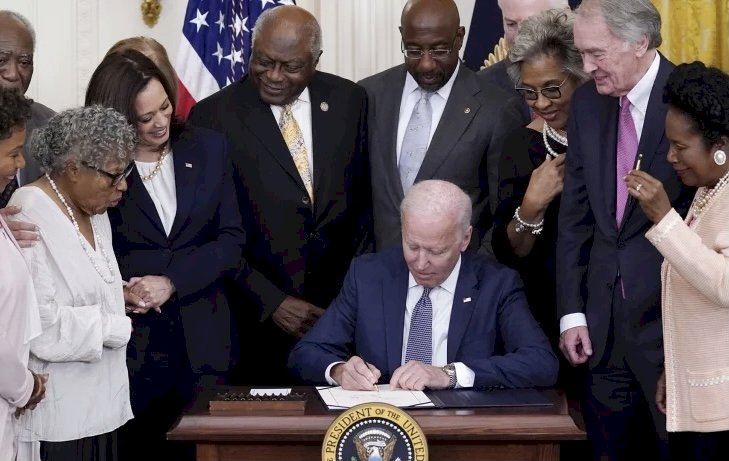HOW PRESIDENT BIDEN TRANSFORM JUNE NINETEENTH CELEBRATIONS TO A NATIONAL DAY
We bring to you the June 19TH history

On June 19, 1865, Union Army Maj. Gen. Gordon Granger announced that more than 250,000 enslaved people in Texas were free. The newly emancipated responded with cries of joy and prayers of gratitude.
A celebration that became known as Juneteenth. Black Texans marked the day each year with parades and picnics, music and fine clothes.
President Biden on Thursday signed into law a bill creating a federal holiday to commemorate Juneteenth, the day marking the end of slavery in Texas. Because June 19 falls on a Saturday this year, most federal employees will get this Friday off.
On June 19, 1865. Two months after the Civil War had ended, more than 250,000 enslaved people in Texas were freed. The newly emancipated responded with cries of joy and prayers of gratitude, a celebration that became known as Juneteenth.
Black Texans marked Juneteenth each year with parades and picnics, music and fine clothes. The Juneteenth gatherings grew through the aborted promise of Reconstruction, through racial terror and Jim Crow, and through the Great Depression, with a major revival in the 1980s and 1990s.
But why celebrate nationally something that happened in a single state? As Black Texans moved across the U.S., they brought their day of jubilation with them. Embracing that day has become a fitting way to mark the end of a war fought to preserve slavery.
At the start of the Civil War, these states still had legalized slavery. Some were border states that remained loyal to the Union. In New Jersey, a gradual abolition law passed in 1804 — so gradual that the 1860 U.S. Census counted 18 people as “slaves.”
Congress abolished slavery in the District of Columbia on April 16, 1862. Nine months later, on Jan. 1, 1863, Lincoln declared enslaved people in the Confederacy forever free — though slavery remained in effect on the ground. Enforcement of the Emancipation Proclamation generally followed battle lines, encompassing all of the Confederacy except Texas by the end of the war.
Four states abolished slavery before the end of the war: Maryland, Missouri, the new state of West Virginia and Tennessee. Juneteenth: On June 19, 1865, in Galveston, Tex., Granger issued General Order No. 3, freeing all enslaved people in Texas, in accordance with the Emancipation Proclamation issued two and a half years earlier.
Last summer, amid the racial-justice protests following the murder of George Floyd, millions of White Americans became aware of Juneteenth for the first time. On Thursday, President Biden signed the bill to make Juneteenth a federal holiday.
You Can Also Read













